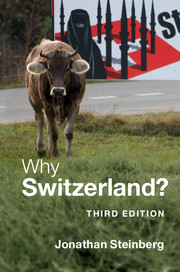9 - The crisis of Swiss identity
Published online by Cambridge University Press: 05 November 2015
Summary
The seriousness of the crisis
Something has gone wrong with the Swiss model which had seemed so successful. In the May 2014 issue of Schweizer Monat, René Scheu, the editor-in-chief, described the country as a ‘Land of Myths’:
The Swiss flag flies everywhere; those who hold it high are less patriotic than insecure; from the low taxes to the strong army to the free market for labour, the Swiss cling to concepts that in the best cases exist as relics … More strongly than ever the Swiss seem to feel uncomfortable and to question their small state.
The newspapers are full of discussions about Swiss identity: what is it? How did it arise? Can it be preserved? When they publicly search their souls in this way, the Swiss begin by assuming that they are not like other European peoples. The central argument of this book is that they are right. There is, or was, a Sonderfall Schweiz, a Swiss special case, which emerged from the fusion of geographic factors, the evolution of the micro-economy, the survival of archaic, communal forms, the early commercialisation of meat and milk products, the physical strength of mountaineers, the accumulation of urban wealth, neutrality, the peculiar religious mosaic, the use of direct democratic devices, federalism, communal autonomy, multilingualism, and those unwritten rules of behaviour which lead to concordance and magic formulae, conflict avoidance and tolerance. This specialness made the Swiss feel both superior and uneasily inferior to other states. By comparison with their more homogeneous neighbours such as the French, Germans or Italians, they feel somehow abnormal.
All of them feel ‘Swiss’ outside Switzerland. As one Swiss friend put it to me, ‘Swissness, which is strong in New York, evaporates in the train from Zürich to Solothurn.’ Inside the country they disintegrate into all sorts of micro-identities – cantonal such as Basler, Zürcher, Vaudois, Jurassien or regional such as the Italian Swiss, who divide into Sottocenerini and Sopracenerini (those who live below and those who live above Monte Ceneri) or ultimately into identities as citizens of one of the communes.
Outsiders find this hard to understand. There is something unnatural about a country without a proper national identity. Ever since the French Revolution, nationalists of every colour have attempted to seduce or browbeat the three main Swiss linguistic communities into surrendering their apparently unnatural allegiance to Switzerland.
- Type
- Chapter
- Information
- Why Switzerland? , pp. 307 - 327Publisher: Cambridge University PressPrint publication year: 2015



